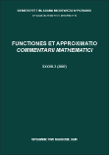
FUNCTIONES ET APPROXIMATIO COMMENTARII MATHEMATICI
Scope & Guideline
Fostering Collaboration in Mathematical Research
Introduction
Aims and Scopes
- Number Theory and L-functions:
A significant focus on number theory, particularly the analysis and properties of L-functions, including the study of moments, averages, and their implications in various mathematical contexts. - Algebraic Structures and Methods:
Explores algebraic techniques and frameworks, including matrix continued fractions and polynomial functions, to analyze complex mathematical problems. - Analytic Techniques in Mathematics:
Utilizes analytic methods to address problems in number theory and related fields, emphasizing the importance of techniques such as exponential sums and Fourier analysis. - Statistical Properties and Random Variables:
Investigates the statistical behavior of sequences and functions, including sums of random variables and their distributional properties. - Geometric and Diophantine Analysis:
Engages with geometric aspects of mathematics, particularly in relation to Diophantine equations and their solutions, contributing to the understanding of rational points and algebraic varieties.
Trending and Emerging
- Advanced Studies in L-functions:
Recent publications show a significant increase in research surrounding L-functions, particularly their moments and applications in number theory, indicating a growing interest in their deeper properties and relationships. - Statistical Mechanics and Random Processes:
There is a burgeoning interest in the statistical mechanics aspects of mathematics, particularly concerning random variables and their averages, reflecting a trend towards probabilistic methods in number theory. - Applications of Algebraic Geometry:
A noticeable rise in the application of algebraic geometry to number theory, particularly in the study of rational points on varieties and Diophantine equations, suggests an interdisciplinary approach that is becoming increasingly popular. - Integration of Analytic Techniques:
Emerging themes reveal a trend towards integrating analytic techniques with algebraic structures, showcasing an innovative approach to traditional problems in number theory. - Interdisciplinary Approaches:
An increase in papers that bridge mathematics with other fields, indicating a trend towards interdisciplinary research and the application of mathematical principles in diverse scientific contexts.
Declining or Waning
- Elementary Number Theory:
There has been a noticeable decrease in the publication of papers focused on fundamental aspects of elementary number theory, as researchers seem to be gravitating towards more complex and abstract areas. - Basic Combinatorial Analysis:
Papers dealing with basic combinatorial methods and their applications have become less frequent, suggesting a move towards more sophisticated combinatorial frameworks. - Classical Geometric Methods:
Research utilizing traditional geometric approaches in number theory has waned, as newer analytical and algebraic methods gain prominence in the field.
Similar Journals

PUBLICATIONES MATHEMATICAE DEBRECEN
Connecting Scholars through High-Quality Mathematical ResearchPublicationes Mathematicae Debrecen is a renowned international journal published by the University of Debrecen, Institute of Mathematics, situated in Hungary. This journal, with both ISSN 0033-3883 and E-ISSN 2064-2849, has established itself in the field of mathematics since its inception, with coverage extending from 1997 to 2024. Recognized for its rigorous academic standards, it currently holds a Q3 ranking in the mathematics (miscellaneous) category for 2023 and ranks at the 42nd percentile among general mathematics journals in Scopus. Publicationes Mathematicae Debrecen aims to disseminate high-quality research across various areas of mathematics, contributing to the advancement of knowledge and practice in this dynamic field. Although it is not an open-access journal, its readers can access a wealth of scholarly work that addresses both theoretical and applied mathematical issues, making it an invaluable resource for researchers, professionals, and students alike.

Research in Number Theory
Advancing the frontiers of algebra and number theory.Research in Number Theory is a prestigious journal eagerly embraced by the mathematical community, focusing on the intricate and profound aspects of algebra and number theory. Published by Springer International Publishing AG, the journal showcases cutting-edge research from 2015 to 2024, making it a pivotal platform for advancing knowledge in its field. With its ISSN 2522-0160 and E-ISSN 2363-9555, this journal holds a commendable position in the academic ecosystem, as evidenced by its ranking in the Q2 quartile for the category of Algebra and Number Theory in 2023. Despite being positioned within a competitive percentile, this journal aims to foster innovation and discovery, providing researchers, professionals, and students with valuable insights into the ever-evolving landscape of number theory. While the journal currently operates under a traditional publishing model, it is committed to disseminating high-quality, impactful research that propels the discipline forward. Join the conversation and contribute your work to a publication that is at the forefront of mathematical discovery.
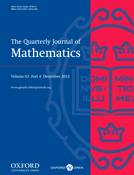
QUARTERLY JOURNAL OF MATHEMATICS
Connecting Scholars through Rigorous ResearchQuarterly Journal of Mathematics, published by Oxford University Press, stands as a pivotal resource for the mathematical community, focusing on a broad spectrum of topics in the field of mathematics. With its esteemed history dating back to 1930, this journal continues to foster innovative research and discussions, providing a platform for scholars to share their findings and insights. Although the journal currently holds a Q3 classification in mathematics (miscellaneous) and is ranked #207 among general mathematics publications in the Scopus database, its commitment to quality and rigorous peer review ensures that it remains relevant and insightful. Researchers, professionals, and students alike will find the Quarterly Journal of Mathematics an invaluable tool for advancing knowledge and understanding in various mathematical disciplines, making it an essential addition to any academic library.

Pure and Applied Mathematics Quarterly
Exploring the Depths of Theoretical and Practical MathematicsPure and Applied Mathematics Quarterly is a prestigious journal published by INT PRESS BOSTON, INC, focusing on the diverse and evolving field of mathematics. Since its inception in 2007, this journal has grown significantly, currently holding a Q1 ranking in the Mathematics (Miscellaneous) category for 2023, positioning it among the leading publications in the discipline. With a commitment to publishing high-quality research, Pure and Applied Mathematics Quarterly fosters innovation and dialogue within the mathematical community by providing a platform for theoretical advancements and practical applications. The journal remains accessible to researchers and professionals through its ISSN 1558-8599 and E-ISSN 1558-8602, although it does not currently offer open access. As a vital resource for mathematicians, educators, and students, this journal endeavors to expand the frontiers of mathematical knowledge and contribute to the academic dialogue surrounding this fundamental science.
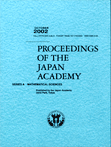
PROCEEDINGS OF THE JAPAN ACADEMY SERIES A-MATHEMATICAL SCIENCES
Connecting Ideas, Inspiring Discoveries in Mathematics.PROCEEDINGS OF THE JAPAN ACADEMY SERIES A-MATHEMATICAL SCIENCES, published by the JAPAN ACADEMY, serves as a premier platform for disseminating original research in the field of mathematical sciences. Based in Japan, this journal has been a vital contributor to the global mathematical community since its inception, with continuous publication from 1996 to 2024. While it currently holds a Q3 ranking in the miscellaneous mathematics category according to the 2023 category quartiles, it provides an invaluable repository of knowledge that facilitates advancements in various mathematical disciplines. Although it is not an open-access journal, it remains widely regarded for its rigorous peer-review process, ensuring that high-quality research is presented to its audience. The journal is essential for researchers, professionals, and students eager to stay informed about novel developments and trends in mathematics. With an ISSN of 0386-2194, it aspires to foster collaboration and innovation within the mathematical sciences.

FIBONACCI QUARTERLY
Innovating Insights in Mathematical ResearchFibonacci Quarterly is a notable journal published by the Fibonacci Association, focusing on the captivating realms of mathematics and its applications, particularly Algebra and Number Theory. With its ISSN 0015-0517, the journal serves as a vital platform for the dissemination of original research and innovative ideas within its field. Established in the United States and operating since its inception, the journal covers an extensive timeline of contributions from 1996 to 2008 and continues its journey of academic excellence with ongoing publications through 2024. Currently ranked in the Q3 category for Mathematics (Algebra and Number Theory) as of 2023, Fibonacci Quarterly has established itself as an essential resource for researchers and practitioners alike, despite its modest Scopus rank of #91 out of 119 with a 23rd percentile ranking. Although not an open-access journal, it provides crucial insights and advancements that fuel scholarly discussions and foster academic growth in the mathematical community. Whether you are a researcher, a professional, or a student, Fibonacci Quarterly offers a wealth of knowledge that enriches the understanding of number theory and algebra, making it an indispensable resource in the pursuit of mathematical clarity and innovation.
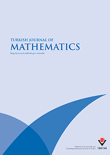
Turkish Journal of Mathematics
Advancing Mathematical Frontiers with Rigorous ResearchTurkish Journal of Mathematics is a prestigious academic publication dedicated to the advancement of mathematical research across a variety of subfields. Established in 1995 and published by the Tubitak Scientific & Technological Research Council Turkey, this journal has built a solid reputation, especially noted for its significant contributions to the field over the years, with its convergence spanning from 1995 to 2002 and again from 2006 to 2024. The journal, which holds a commendable Q2 ranking in Mathematics (miscellaneous) and is positioned in the 66th percentile of Scopus rankings for General Mathematics, aims to disseminate high-quality original research, reviews, and innovative methodologies to advance both theoretical and applied mathematics. Researchers, professionals, and students alike will find invaluable resources within its pages, providing insights that are pivotal for academic and practical applications in mathematics. Although it does not currently offer open access options, the journal remains an essential platform for those looking to engage with the forefront of mathematical inquiry.

COMPTES RENDUS MATHEMATIQUE
Bridging theory and practice in the world of mathematics.COMPTES RENDUS MATHEMATIQUE is an esteemed open-access journal published by ACAD SCIENCES, dedicated to advancing the field of mathematics. Founded in France, this journal has established itself as a vital platform for scholarly communication within the mathematical community, receiving a commendable Q2 ranking in Mathematics (Miscellaneous) for 2023, reflective of its commitment to high-quality research dissemination. The journal’s impact is further underscored by its position within the Scopus rankings, where it is recognized among the top 205 out of 399 journals in the broader category of General Mathematics. With an open-access model launched in 2020, COMPTES RENDUS MATHEMATIQUE ensures that research is widely accessible, promoting collaboration and innovation within academia. Covering a wide range of mathematical disciplines, it welcomes contributions that push the boundaries of knowledge in the field. The journal's convergence of issues from 2002 to 2024 positions it as a reliable source of foundational and cutting-edge mathematics research, appealing to researchers, professionals, and students alike. Its address is located in the heart of Paris at 23 Quai de Conti, 75006, France, reinforcing its legacy in a city renowned for its scholarly contributions.

Ukrainian Mathematical Journal
Pioneering Insights in MathematicsThe Ukrainian Mathematical Journal is a prominent academic publication in the field of mathematics, focusing on a diverse range of topics that appeal to researchers, professionals, and students alike. Published by Springer, this journal has been an important platform for disseminating significant mathematical research since its inception in 1957. With the aim of fostering knowledge and collaboration within the mathematical community, the journal curates high-quality articles that meet rigorous scholarly standards, evidenced by its Q3 ranking in the miscellaneous mathematics category for 2023. Although it currently does not offer open access, the journal remains accessible through various institutional subscriptions. It serves as a vital resource for ongoing discourse in the field and invites contributions that further advance mathematical understanding.
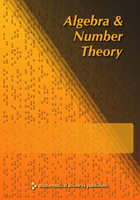
Algebra & Number Theory
Connecting Scholars Through Cutting-Edge Mathematical InsightsAlgebra & Number Theory, published by Mathematical Science Publications, stands at the forefront of mathematical research, particularly in the fields of algebra and number theory. With an ISSN of 1937-0652 and E-ISSN 1944-7833, this esteemed journal provides a dedicated platform for the dissemination of cutting-edge theoretical advances and practical applications. It has achieved a Q1 category ranking in both algebra and number theory according to the 2023 quartiles, reinforcing its critical role in shaping contemporary mathematical discourse. The journal serves as an essential resource for researchers, professionals, and students alike, offering insights into diverse mathematical methodologies and fostering open dialogue among scholars. Although it does not provide open access, its robust impact factor reflects the high quality and relevance of its published work. Based in the United States at the University of California, Berkeley, the journal's commitment to excellence continues to attract contributions that push the boundaries of mathematical understanding.